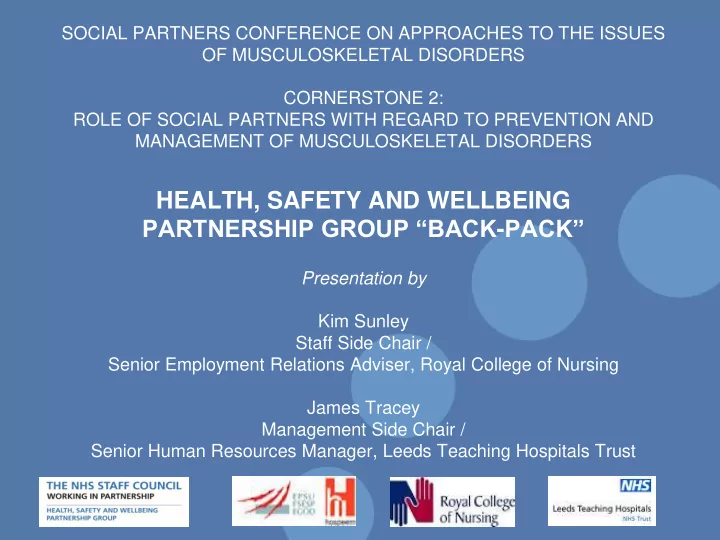

SOCIAL PARTNERS CONFERENCE ON APPROACHES TO THE ISSUES OF MUSCULOSKELETAL DISORDERS CORNERSTONE 2: ROLE OF SOCIAL PARTNERS WITH REGARD TO PREVENTION AND MANAGEMENT OF MUSCULOSKELETAL DISORDERS HEALTH, SAFETY AND WELLBEING PARTNERSHIP GROUP “BACK - PACK” Presentation by Kim Sunley Staff Side Chair / Senior Employment Relations Adviser, Royal College of Nursing James Tracey Management Side Chair / Senior Human Resources Manager, Leeds Teaching Hospitals Trust
Introduction This presentation will cover Who we are and what we do What we have achieved What the Back-pack is How we support working in partnership
UK SOCIAL PARTNERSHIP WORKING National Health Service (NHS) Staff Council Agrees and implements the pay system, including any variations to the national agreements, across the NHS Agrees and implements variations in the harmonised national conditions of service across the NHS; the discussion of any other general issues of common concern on pay and terms and conditions of service. Is the forum to discuss issues relating Health and Safety, Equality and Diversity, NHS Pensions and updates from the UK countries HSWPG reports to the Staff Council
Who we are Tri-partite working sub-group of the Staff Council Management Staff Side Special interest groups Health and Safety Executive (HSE) NHS Protect Institute of Occupational Safety and Health
What we do Our raison d’etre is to work in partnership to deliver: A rise in standards of workplace health, safety and wellbeing in healthcare organisations Promote a safer working environment for health staff Promote partnership working at all levels We do this through Advice and guidance Endorsing good practice Responding to consultations Workshops Commissioning research
What we have achieved Examples include Workplace Health and Safety standards (with HSE) “Prevention and Management of Sickness Absence” guidance Sharps Injury prevention guidance and workshops “Health and Wellbeing in Healthcare settings” research “Working Longer” Workshop (Birmingham March 2012) Lone Worker Guidance (with NHS Protect) “Back Pack” healthy back guidance
Rationale for Backpack Musculoskeletal disorders – main cause of sickness absence and ill health retirements in the health sector Significant costs to the sector in terms of absence and compensation payments Inconsistent standards of application of manual handling regulations Promote partnership working and role of union safety representative
Backpack section 1: Introduction to Backpack Sets the scene – facts and figures National frameworks Key messages: Economic case Not just ‘back’ problems Importance of risk assessment
Backpack section 2 – The Staff Guide Staff responsibilities Employers responsibility to carry out risk assessments Reporting risks and incidents Helping yourself
Backpack section 3: Line Manager’s Guide The issues: Patient handling Back pain Bariatrics ULDs Principles of good line management Key legislations Responsibilities of line mangers Risk assessment and management
Backpack section 4: The Safety Representative’s Guide Role of safety representatives Application of the role to the prevention of MSDs: Inspections Health and safety committee Supporting risk assessment Body mapping
Backpack section 5: Workplace and Individual Assessment Tool Aimed at specialists Supporting return to work Preventing a minor injury becoming a major injury Self-refer or line management referral
Backpack section 6: Further information and quick links
Communication How we ensure the Backpack (and other) documents are communicated Website Launched to coincide with European / UK events Health and Safety Representatives Blog / Twitter News / media
Effective Partnership Working • Value of working in partnership • Role of representatives • Importance of consultation • Joint working through committees and inspections
Summary • Partnership working is important in developing national guidelines • The Backpack is a six part guide developed to support organisations prevent and manage MSDs • Local partnership working between employers and trade union safety representatives is key to implementing guidance • MSDs continue to be a challenge as environment of care changes and with the rise in bariatric patients
Thank you for listening… FOR LISTENING
Questions?
Recommend
More recommend